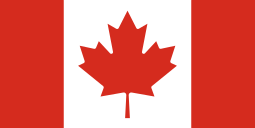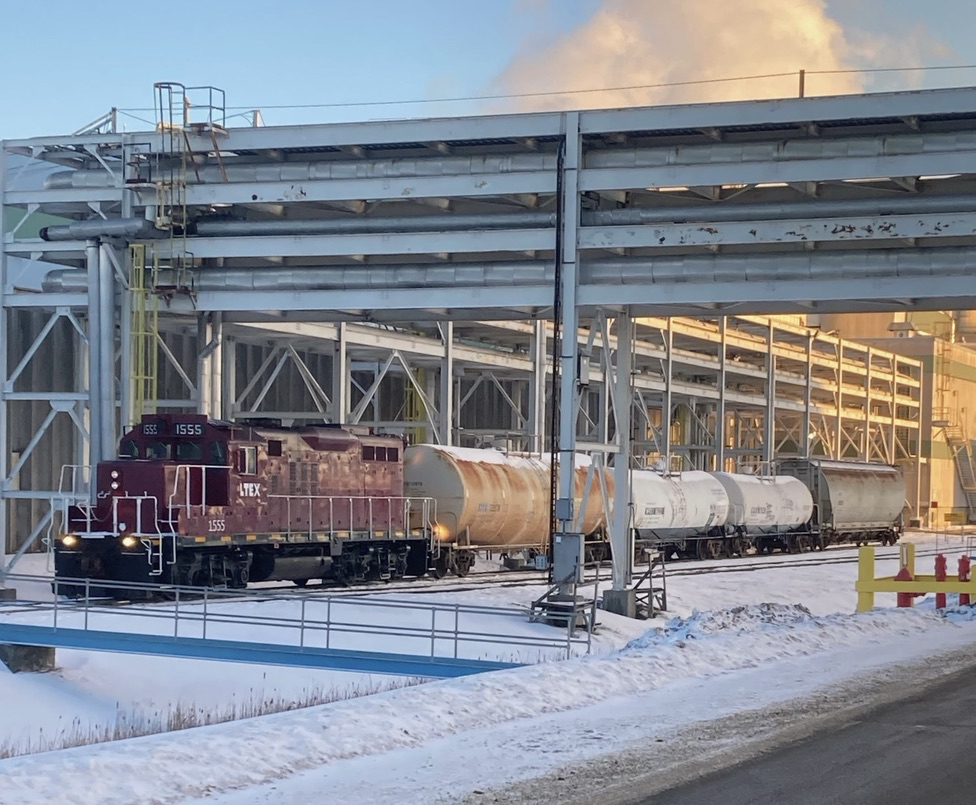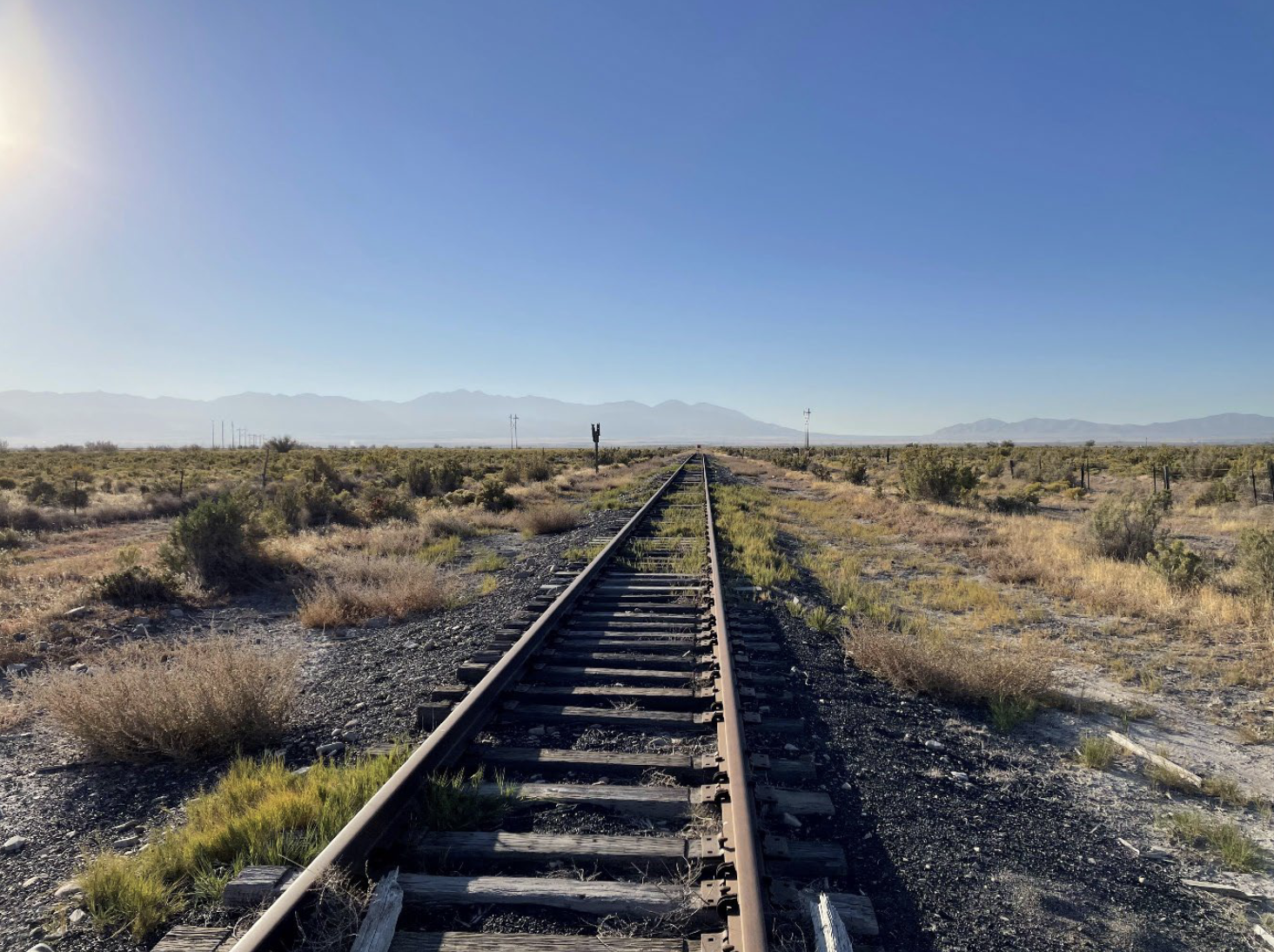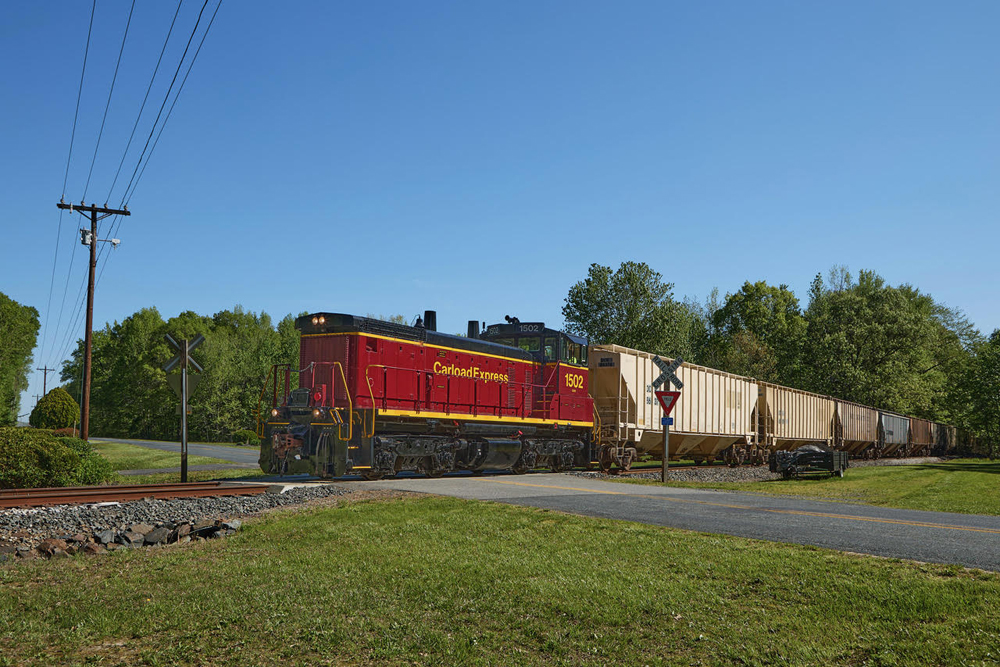In a deal brokered by the Canadian government, Canadian Pacific and Canadian National trains have been sharing some rail routes to bypass blockades by protesters, most notably the Tyendinaga Mohawk blockade near Belleville, Ontario, that was broken up Monday by Ontario Provincial Police.
The CBC reports the arrangement began last week but was kept quiet out of concerns that it would spark additional blockades. While trains are now running on the CN line through Belleville, the agreement is still active in other areas where blockades remain. The CBC reports that CN crews operated trains with CP locomotives to help keep the agreement a secret. Both railroads declined comment.
Ten people were arrested Monday as the blockade was cleared near Belleville starting at about 8 a.m. local time, with the first train passing through the site about 7 p.m. after a snowplow was cleared off the tracks and the right-of-way was inspected and repaired. With that line cleared, VIA Rail Canada announced plans to resume service as of Friday on a number of suspended routes. That includes Toronto-Montreal and Toronto-Ottawa corridor service; the Montreal-Halifax Ocean; and Senneterre-Jonquiere, Quebec., service. Other suspended trains are now scheduled to resume March 2.
The end of the Tyendinaga blockade did spark additional protests. A blockade by members of the Gitxsan Nation went up near Smithers, British Columbia, on Monday afternoon, but the CBC reports arrests, including at least two hereditary chiefs, occurred at that site late Monday night. The Royal Canadian Mounted Police and CN declined comment and no information on the total number of arrests was available.
This morning, another protest near Hamilton, Ont., has shut down GO Transit commuter trains between Hamilton and Niagara Falls, Ont. Protesters from the Six Nations of the Grand River said they were responding to Monday’s action near Belleville.
A blockade at CP’s Adirondack Junction, which began Feb. 8, was found by a radio reporter to be unoccupied early this morning, although its status was unclear. CP has not obtained an injunction to clear that blockade, but in a Monday meeting, residents of Kahnawake, Que., expressed concerns about a repeat of a 1990 crisis in which Kahnawake Mohawks blocked a bridge for 78 days, an incident which led to the death of one police officer.
A protest that began Saturday in Saskatoon, Saskatchewan, was continuing as of Monday, but so far, protesters there have not blocked the tracks, remaining beside the right-of-way and forcing trains to slow down, CJME radio reported.















So would anyone in Ottawa or on this forum have paid any attention if the FN had not blockaded?
Well put James.
My comment about the envelope was more in regards to the FN protesters yelling about “use the system” vs the other side who also were FN wanting to earn their income on a construction site.
I know no shortage of non natives the eagerly await the envelopes also.
I like Anna’s comments. It seems that she has some good insights…
This really isn’t a Trains discussion, though — but a few comments anyway (he ducks for cover). There is tremendous tension in some First Nations bands between the elected councils and the hereditary chiefs. It is worth remembering, however, that the elected council system was imposed on the First Nations by the Europeans; it is not a First Nations construct. Sometimes it works. Sometimes it doesn’t.
Second, we (Canadians) would like to think we are tolerant and open and welcoming; it is part of our “shtick”. Problem is, it isn’t true. Quebec, for a notable example, is arguably the least tolerant democratic government entity in the world. British Columbia is not far behind, although there, at least, if you are a Sikh or a Jew or a Muslim you can wear your customary clothes at work and school.
With regard to treatment of the First Nations in Canada vs. Native Americans in the United States. Both countries have extensive records of mistreatment. Both need to do much better. To regard the Canadian’s treatment as superior, however, is to ignore little things… like the Sixties Scoop, the residential schooling of the children even today, ignoring the murdered and missing indigenous women, siting hydroelectric dams and reservoirs without regard to First Nations concerns (Quebec again…) and on and on. Both countries (and Provinces) need to regard their own errors first, before anyone can attack others.
Someone mentioned money. This is not just a First Nations problem. Most folks who live a “modern” life tend to suppose that one can buy anything. Unfortunately, many people who don’t — whether they are First Nations or farmers or fishermen or loggers don’t see it that way. Yes, the little brown envelopes are welcome. Since the traditional ways of life and territories have been eliminated, they are even vital. But the bribes from the “civilized” areas can’t compensate for the loss of the land and the life.
And no, shipping by rail is not a good alternative to big pipelines. But that brings up a whole other layer of bother at which we as Canadians aren’t doing well either. Won’t go there, at least not today!
Several years ago I walked between two FN groups on a local construction site, one group construction workers, the other protectors of the land” they say. One group yelling we need the jobs, the other group yelling use the system. They love the little brown envelopes with the Canadian flag and the cheque inside that arrives monthly.
So what I guess I’m trying to say, until the internal struggle between the elected band councils and the hereditary chiefs / confederacy on the indigenous lands and reservations is settled this unrest is going to continue.
Last week I tried to shine a little light on our history in Canada with our FN some could get an insight to the problems we all face. This is a complicated matter. Blockades are not the answer and now the radicals have been empowered. There is so much struggle within the FN between the two governing bodies, the elected council which governs like our society vs the Confederacy which follow traditional indigenous law, they don’t get along and from an outsiders view probably despise each other, there are blockades, burnt buildings etc on the reservation as a result.
Living right beside the First Nations of the Grand you can get a better understanding, take for example the Niagara Reinforcement Powerline, most likely what Anna has referred to in her post. Has taken 20 years to build through the reservation and recently completed only by court order and injunctions. The band is part owner now and gets a royalty, the Confederacy says its wrong and should not be on the reservation. Sounds like the pipeline debate of today.
I don’t know what the answer is, but I can tell you from first hand witness bringing in the troops and aggressive police action will only escalate the protests.
Thats a lot of effort by CN and CP to please extortionists.
This does not bode well and there is going to be damage to FN credibility. Who will pay for damage and costs associated with ROW repair costs. If they did this to my office, I would send FN a bill. (But nobody is responsible any more….)
wow. I guess I just do not understand any of this. As civilized persons have been instituted in governments over the last 100 years or so, we are now in the realm of the “rule of law”. If you break the law, you must receive consequences. Otherwise chaos reigns, I would think. To make and enforce our laws for 98% of the population may not be ideal for that 2%, but that is the best with which we have developed.
Things seem to be heating up. The CBC is showing tires burning on the ROW. This can’t be good for the sleepers. Also, in the Greater Toronto Area there are blockades of some of the GO lines. In Sault Sainte Marie they have blockaded the entrance to the International Bridge.
My sources in the area are telling me that possibly electrical transmission lines might be targeted next. If they (the protesters) start bringing down transmission towers then it will really get serious, and the Canadians will have to deploy troops.
For those who do not know this, a nuclear reactor generating station has to have a load in order to operate. If the load is removed (for example, if the transmission lines are brought down) the reactor has to shut down. Since a goodly chunk of Ontario power comes from three generation facilities, if these lines are brought down it would be a serious blow to the Canadian economy. Not to mention it is the middle of winter there and a lot of people depend on electricity for heat.
Terrorism, anyone? As if we desperately need something like that.
The above comments are generic in nature and do not form the basis for an attorney/client relationship. They do not constitute legal advice. I am not your attorney. If you add one hafnium to another hafnium, do you get a holmium?
….10 arrested
catch and release
what a joke
let us hear about their punishment !
I did and many others should tear up our liberal card.
Time to call in the Forces and time for the criminals to face real consequences.
Anyone who thinks Justin solved this problem knows nothing about the problem and knows nothing about Justin. Justin needs to go.
GERALD – Your post fails on every single level.
I know we don’t call them FN here in USA. I’m using shorthand to get to the point with shorter sentences. You correcting my choice of words means you don’t have a viable point to advance.
Shipping by rail instead of pipelines is not a “simple solution” as you say, it’s the worst possible alternative. And giving into criminals is not a solution of any kind.
The solution – the only solution – is for OPP, RCMP/GRC, and the Forces to bust the blockades and put the criminals into internment.
And Justin needs to go. Frankly I can’t stand the man. With his late father he shares a name, a bloodline, an office, and the same religion. Other than that, nothing. To use a term people of Justin and Pierre’s religion (and my own) would know, Justin isn’t fit to tie Pierre’s shoelaces.
Gerald McFarlane: in this case, cancelling the pipeline which sparked the initial protest would do little good, since it’s meant to transport natural gas, which is not hauled by rail. Beside, the elected officials of the all First Nations tribes that are concerned by the pipeline have all accepted the project, as it will give the tribes and their members some money and job benefits. Those who are protesting are considered dissidents by many of their own people – for now. This is not a simple problem.
Charles Landey,
Your statement is a little off, the First Nations in Canada have more rights than Native Americans do in the U.S.(we don’t call them First Nations here, never have and never will). I believe they also have more pure blood First Nations people than we have pure blood Native Americans. Further more, what they’re doing technically isn’t domestic terrorism, it’s not violent protests either, it is disrupting commerce, but not terrorism.
This simple solution, cancel the pipeline and ship everything by rail.
During the 1990 “Oka Crisis”, not only was the Mercier Bridge (highway) bridge blocked, the CP line through Adirondack Jct was also closed; CP and Conrail trains detoured over CN through St. Lambert (which itself had a blockade this week). An emergency commuter service was run over CN lines to St. Isadore (two trains per day using West Island ex-CP equipment.)
The First Nations in Canada have their hard liners as well. In Northern Ontario there is, for example, a tribal elder for one of the Algonquin bands who absolutely hates the white man – hates with a passion, and who seems to pass up no chance to stick it to the paleface.
There are many men of good will on both sides but, like all such disputes, it is the hotheads who seem to get the attention.
I have no comment to make concerning the validity (or lack thereof) of their arguments and concerns. I simply wish and hope that reason will prevail, an equitable and sound agreement can be worked out, and all this nonsense will pass into history.
I also have the habit of barfing into the wind.
The above comments are generic in nature and do not form the basis for an attorney/client relationship. They do not constitute legal advice. I am not your attorney. Hey, Danger! Where’s the fire? In your eyes, Leftenant Bradshaw.
JAMES HALL – Sorry I don’t buy it. First Nations in Canada and USA both have put First Nations in special status which means they have all rights of US or Canadian citizens and some rights in addition. In other words, more rights than I have.
What’s past is past. Canada like USA is full of people who are descended from the oppressed, and it’s not only the First Nations nor have the First Nations have had it uniquely bad.
As one example Essex and Kent Counties (Ontario) were the immigration points for USA Afros escaping for their lives. Really have Canadian Indians (in the distant past) had it worse than USA persons (in the distant past) held in slavery? Come on! I don’t see Afro Canadians blocking the railways. Do you? No they get on with their lives, go to school and get jobs and raise their families like anyone else. Maybe Canada’s First Nations should do the same. I have zero sympathy for them. It’s time for them to get on with their Canadian citizenship and make something of themselves.
James Hall, your comment in French seems to imply that Quebec is treating First Nations worst than other provinces, but if you look closely, you’ll find that overall tension levels are much lower, with the possible exception of the two Mohawk communities in Kahnawake and Oka. The Quebec government announced last week a 4.7B$ (CAD) development plan for resource projects in Northern Quebec in partnership with the Cree nation, and this plan involves restoring the former CN Chapais sub. between Grevet and its namesake city (abandoned in 1987), and extending the Matagami line to a new deep-sea port on the James Bay. Times change.
Mr Landey why don’t you address your comments to your friendly neighborhood MP.
Mr Symonds, maybe the judge sentenced the perpetrators to time served.
Anyway as I’ve said before I’m no kind of expert just a worn out truck driver. Maybe I should study quantum mechanics, or maybe particle physics and create some new elements.
A comment or two… somewhat general in nature. First, though, let me say that in no way can one justify the kind of terrorism (for that is what it is) which is being engaged in. Not only is it illegal — which it is — but it is morally wrong for any group (and I don’t care whether it is First Nations, Jihadists, Black Liberation Army, or tree-huggers in California) to take actions which hurt other people.
That said… it also has to be considered that Canada in general, and certain provinces in particular (ecoutez-vous, mes amis?) have an absolutely appalling record when it comes to relationships with the First Nations. There are deep-seated grievances there which have taken centuries to build up, and which are not being addressed in any useful way by either the Provincial governments nor the Federal government. This does not justify terrorist tactics — but it goes a long way to understand why people might be inclined to employ them. Some deep self examination is in order here, though I have an impression that that’s not going to happen.